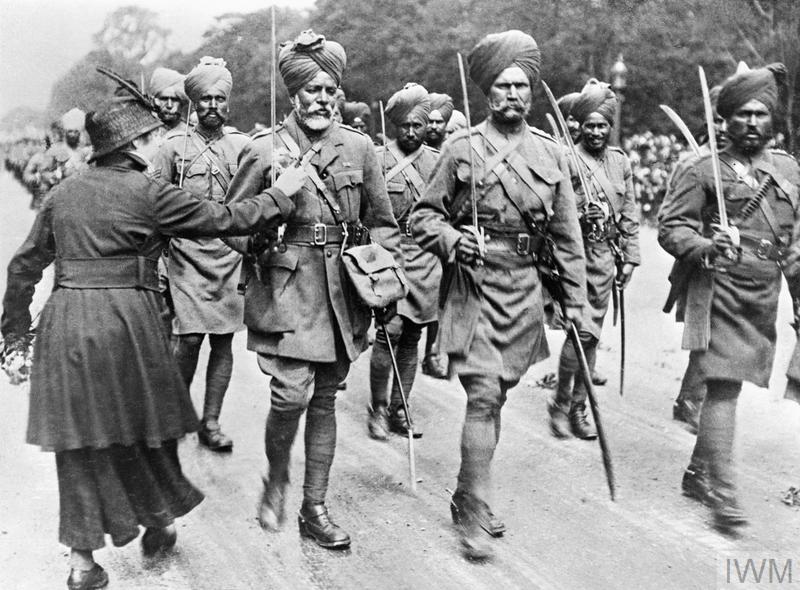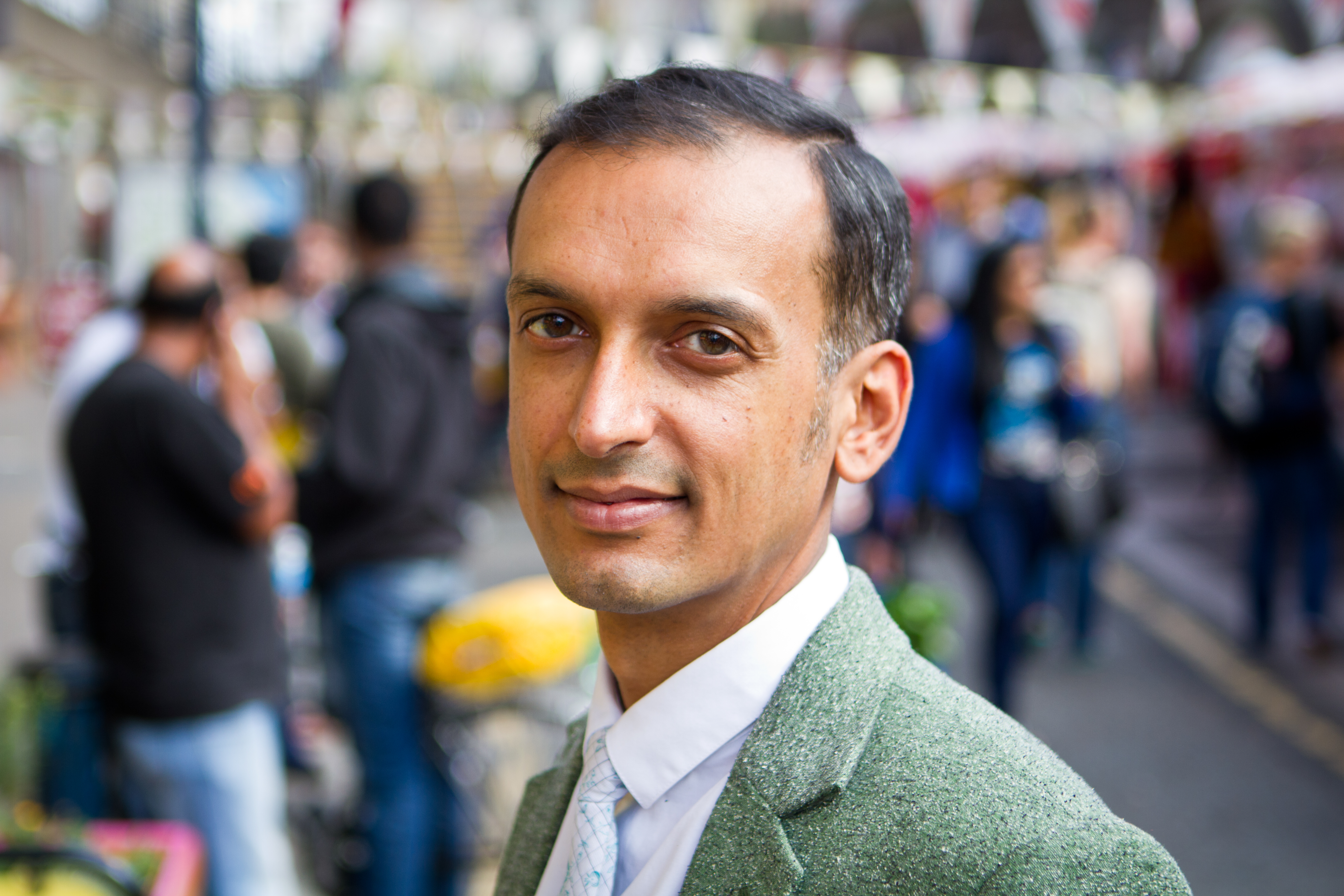As Britain marks a centenary since the Great War came to an end there are increasing efforts to commemorate the three million men from across the British Empire and their key role in securing victory for the Allied Forces.
At the outbreak of conflict in late summer 1914, Britain’s professional army consisted of just 250,000 regular soldiers. Thanks to the addition of 250,000 territorial soldiers and 200,000 reservists, the British Army’s ranks swelled to 700,00; following the introduction of conscription in 1916 it grew to four million in 1918.
Three Million Men From The Commonwealth Joined The War Effort
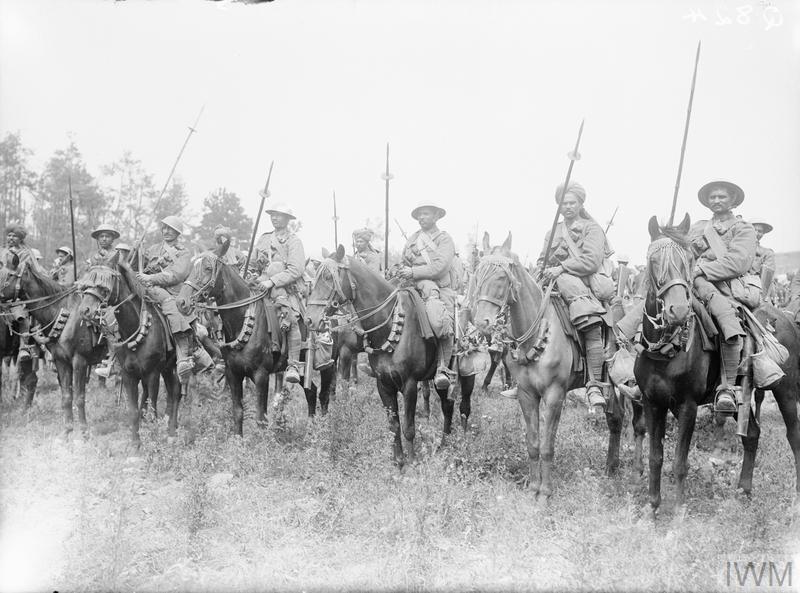 The 20th Deccan Horse at the Battle of the Somme in July 1916 Credit: IWM
The 20th Deccan Horse at the Battle of the Somme in July 1916 Credit: IWM
A further three million soldiers and labourers came from across the British Empire, including 180,000 African soldiers from East and West Africa, 15,00o soldiers from the islands in the Caribbean known as the West Indies, 620,000 Canadians, 410,000 Australians and 100 000 New Zealanders.
The vast majority of the three million men from Britain’s Empire were the one and half million Indians who volunteered and took to battlefields in Europe, the Middle East and Africa.
However, while the contribution of soldiers from Australia and New Zealand is well known in Britain, particularly in the battle at Gallipoli, the participation of non-white servicemen from Britain’s Empire is not.
Historian Shrabani Basu, author of For King and Another Country, an account of Indian soldiers role in World War I, outlines the significance of their involvement. “Indian soldiers played a major role in all theatres of war, both on the Western Front and in Palestine, Turkey, Mesopotamia and North Africa.”
“They were the first of the colonial troops to arrive on the Western Front and held the line against the Germans in the First Battle of Ypres in October 1914, when the British troops were exhausted. If they had not held the line at this crucial time, the Germans would have reached the ports,” Basu says.
Basu also points out that the Indian contribution wasn’t simply manpower. “Indian Maharajas gave generously to the war effort. They donated money, ambulances and sent their troops to the frontline. The Maharaja of Bikaner, was one of those who personally led the charge with his Camel Corps in Egypt.”
‘India flings the Kaiser’s lie back in his teeth and sends her soldiers to help to crush him.’
Daily Mirror, Friday 2 October 1914
In Britain, news of Indian soldiers joining the war effort and arriving on the Western Front was widely hailed. The front page splash of Daily Mirror of October 2, 1914 proclaimed, ‘India flings the Kaiser’s lie back in his teeth and sends her soldiers to help to crush him.’
Basu outlines there was a feeling of goodwill and gratitude towards Indian soldiers. “Women knitted jumpers and scarves for them, and a committee was formed to look into their comforts, providing everything they needed from spices, tea, Indian games, Indians music, sacred books to neem-sticks for their teeth, holy thread for the Brahmans, waterproof turban covers for the Sikhs, and the facilities to cook and eat their own meals.”
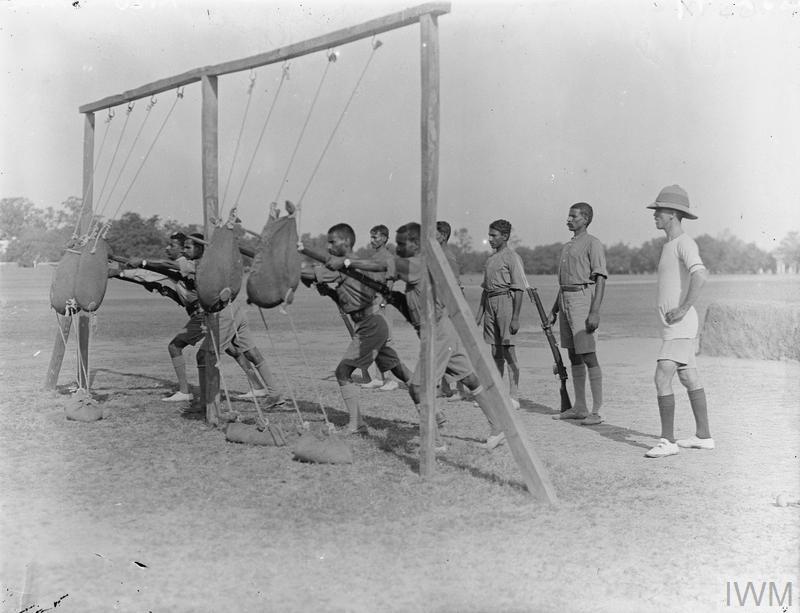 Credit: Indian recruits practising bayonet fighting. Credit: IWM
Credit: Indian recruits practising bayonet fighting. Credit: IWM
Basu’s book recounts the bravery and sacrifices of numerous Indian soldiers in the battlefield, including a teenage pilot from Bengal, Indra Lal Roy. ‘He was only 19 when he died with a dog-fight with German planes over France, even as he was going down he took down two German aircraft – he was posthumously awarded the Distinguished Flying Cross.”
The sons of Manta Singh and George Henderson fought together in the Second World War.
There’s also the remarkable story of a Indian soldier who’s actions forged a bond of friendship spanning a century and three generations. Basu told RightsInfo: “Manta Sikh from the 15th Ludhiana Sikhs sacrificed his life to save his captain George Henderson. The act of bravery led to a lasting bond between both families. The sons of Manta Singh and George Henderson fought together in the Second World War. The friendship carries on for the third generation.”
Remember Together
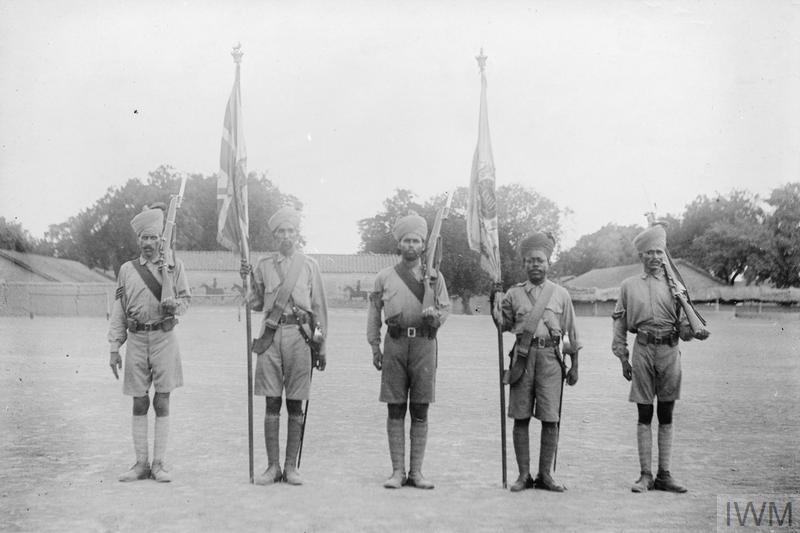 A colour party of the 1st Battalion, 113th Benares Infantry Regiment. Credit: IWM
A colour party of the 1st Battalion, 113th Benares Infantry Regiment. Credit: IWM
Awareness of the role of Commonwealth soldiers has gradually grown in recent years and has been a feature of the centenary of World War I commemorations that began in 2014 and end on Sunday 9 November 2018, at 11am – 100 years after guns fell silent on the Western Front and the armistice began.
This year, integration think tank British Future‘s initiative ‘Remember Together’ has brought people and schoolchildren together to learn about how men from both Britain and the Commonwealth served side by side, fighting for freedom and democracy.
"Had they stayed at home, the history of the world would have taken a different course". Lloyd George on Indian & Commonwealth contribution. Gandhi's surprising role, marked by the Khadi poppy, recalled by Lord Ghadia in the Lords https://t.co/wX2S3GkI80#RememberTogether
— Sunder Katwala (@sundersays) November 9, 2018
The campaign includes events in primary and secondary schools, as well as mosques, synagogues, churches and Gurdwaras, faith groups and has drawn support from across the political spectrum, faith groups, and the Royal British Legion.
we want to say Thank You to all of those who made so many sacrifices for the society we live in today – men and women, young and old, of every faith and ethnicity.
Catherine Davies, The Royal British Legion
Catherine Davies, Head of Remembrance at The Royal British Legion, said: “We owe the First World War generation a huge debt of gratitude for helping shape the world as we know it today including the 1.2m British and Commonwealth Armed Forces who lost their lives on the battlefield.
“This year, 100 years from the end of the First World War, we want to say Thank You to all of those who made so many sacrifices for the society we live in today – men and women, young and old, of every faith and ethnicity.”
Remember Together is highlighting the contribution of 400,000 Indian Muslim soldiers, as this shared history can help challenge Islamophobia and also instil a sense of belonging in young Muslims who feel alienated and are unaware of the role of Muslim soldiers in shaping Britain.
It’s important that we remember this long history we all share
Baroness Warsi
Former Cabinet minister and co-chair of the Conservative Party Baroness Warsi, whose forefathers fought in World War II, believes the British Army and Commonwealth soldiers uniting in a common cause, is key to understanding, multicultural modern Britain.
“Soldiers of different creeds and colours fought side-by-side for Britain a century ago. It’s important that we remember this long history we all share – it helps explain why multi-ethnic, multi-faith Britain looks like it does today and why we can all feel a sense of belonging in our society.”
This Shared History Can Unite Us
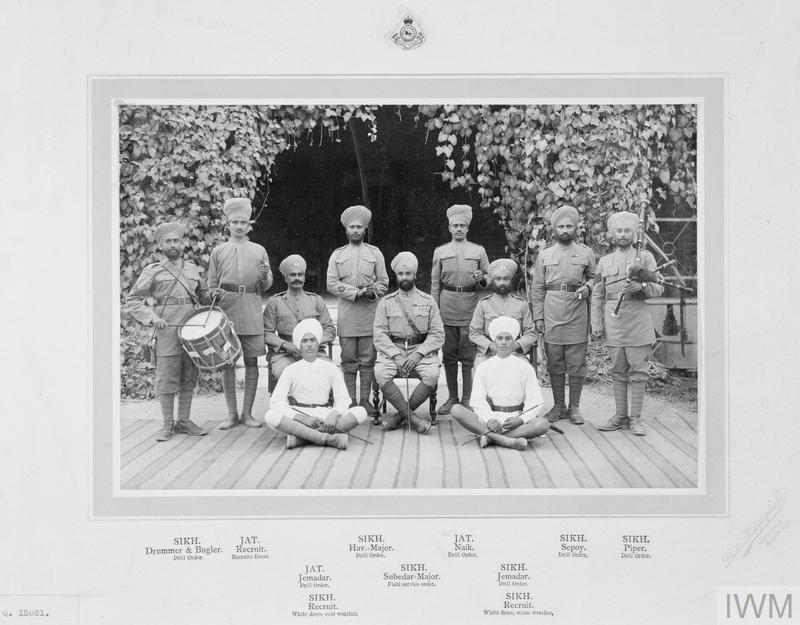 Credit: IWM
Credit: IWM
Harbaksh Grewal, of the UK Punjabi Heritage Association (UKPHA), is surprised that this history is not more widely known and celebrated in Britain’s public culture, especially as it has the ability to unite us in what feels like a febrile, divisive moment.
“Modern British history is incomplete without due acknowledgement of the role of Indian soldiers. The lack of education and awareness astounds and saddens me. I grew up never knowing, and still generations are not being taught this history which definitely has the power to help bridge divides in our modern, often very fractured, society.”
The UKPHA has tried to address this ‘collective amnesia’, as Grewal describes it, through an exhibition in 2014 and online resource, Empire, Faith and War, documenting the role of Sikh soldiers in World War I and World War II.
He feels the contribution of Commonwealth soldiers and Indian soldiers should be at the front and centre of teaching around World War I and World War II in primary and secondary schools, because without them, ‘the story of the 20th century and modern world would be very, very different’.
it is time to finally and permanently reinject this crucial aspect of British and world history back into the mainstream narrative.
Harbaksh Grewal, UK Punjabi Heritage Association
Grewal explained to RightsInfo: “As Britain changes demographically and ethnically, it will become ever more imperative for the Empire’s efforts to be recognised and taught. A hundred years on from the Armistice of 1918 it is about time to finally and permanently reinject this crucial aspect of British and world history back into the mainstream narrative.”
 Gurkhas from the Indian Army at the Victory Parade in London, 19 July 1919, with the Mall in the background Credit: IWM
Gurkhas from the Indian Army at the Victory Parade in London, 19 July 1919, with the Mall in the background Credit: IWM
Another initiative helping to incorporate the untold stories of Commonwealth soldiers into the mainstream, is the Royal British Legion issuing a khadi poppy, a poppy made from hand spun Indian cotton (khadi), in tribute to the Indian soldiers who fought in World War I.
The Legion wants to honour India’s vital contribution to the First World War and wearing the poppy made of khadi is an important and symbolic way to do this.
Catherine Davies, The Royal British Legion
The Royal British Legion’s Catherine Davies, said: “When the First World War broke out, pre-partition India answered the call for help with volunteers from far and wide. They made a huge sacrifice to give us the freedom and the world we live in today.”
We thank the First World War generation who served, sacrificed and changed our world. From India almost 1.5 million volunteers served with Britain and also provided 3.7 million tonnes of supplies, 2327 doctors, 720 nurses and 40 ambulances to Britain. 🙏#ThankYou100 #khadipoppy pic.twitter.com/qud4gwNQEj
— Diwali in London (@DiwaliLondon) November 10, 2018
“Their descendant communities now make up a valued part of life in the UK. The Legion wants to honour India’s vital contribution to the First World War and wearing the poppy made of khadi is an important and symbolic way to do this. Together we can ensure that Remembrance is understood and available to all, and handed to the next generation.”

